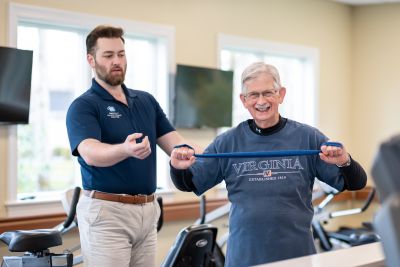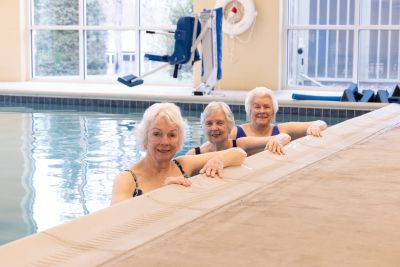Maintaining an active lifestyle is important at any age, but it becomes even more vital as we grow older, not less, as this and other myths about aging might have you believe. The benefits of regular physical activity for seniors are truly life-changing: they improve physical and mental health, and they significantly enhance quality of life. If you need some motivation, keep reading — here’s what you stand to gain from staying active as you age.
 Physical Health Benefits
Physical Health Benefits
Some of the most important biological health benefits of physical activity for seniors include:
- Preventing diseases and chronic conditions. Physical activity helps in managing and preventing various chronic conditions such as heart disease, diabetes, and obesity. Engaging in regular physical activity can reduce the risk of these conditions, which are more prevalent in older adults.
- Improved mobility and balance. Regular exercise strengthens muscles and improves flexibility, which in turn enhances balance and coordination. This reduces the risk of falls, a common concern for aging individuals.
- Enhanced joint and bone health. Many of us develop various aches and pains as we age, but rather than avoiding exercise, being diligent with low-impact exercise can actually lessen those discomforts. Exercise helps maintain joint health and can alleviate symptoms of arthritis by improving strength and flexibility, thus lessening joint pain and stiffness. It also helps to maintain and even restore bone density, which helps to prevent fractures.
- Increased longevity. Staying active can actually extend your life expectancy (and keep you feeling good, too)! Research indicates that regular physical activity contributes to a longer life by preventing early death from various causes, including diseases and chronic conditions that are especially dangerous for older adults.
Mental Health Benefits
The cognitive and mental health benefits of exercise can offer gains in the following areas:
- Better brain function. Physical activity has been linked to improved cognitive function, including better memory, attention, and problem-solving skills. It can even reduce the risk of cognitive decline and diseases such as Alzheimer’s.
- Mood enhancement. Exercise releases endorphins, which are natural mood lifters. Regular physical activity can help reduce feelings of depression and anxiety, promoting overall mental well-being.
- Increased social interaction. Did you know that exercise can help you feel more connected to others (which is also good for your mental and physical health)? Participating in group exercises, sports, and other physical activities provides opportunities for social interaction. This helps to combat loneliness and isolation, which are linked to serious health conditions — including dementia, heart disease, stroke, psychological disorders, illness requiring hospitalization, and premature death.
How to Stay Active in Ways That Work for You
It can be challenging to stick with any exercise routine, but you can make this easier by opting for activities that you enjoy and can perform safely and consistently. Choosing low-impact workouts helps to prevent injury and allow you to keep moving with comfort. This is key, since for seniors, consistent moderate activity is more beneficial than sporadic intense activity. Be sure to aim for a mix of strength and cardio workouts for best results!
 Some great low-impact traditional exercises for seniors include:
Some great low-impact traditional exercises for seniors include:
- Walking
- Hiking
- Swimming
- Water aerobics
- Cycling
- Yoga
- Tai chi
- Any group exercise class designed specifically for older adults
You can also mix in some “sneaky exercise” with other fun activities, such as:
- Gardening
- Ballroom dancing, or any low-impact form of dancing
- Playing with your grandchildren or pets
- Playing lawn games
- Going bowling
- Going shopping (if you’re standing and walking most of the time)
Safety, Accessibility, and Health Recommendations
Here’s what seniors should know before getting started with any new form of physical activity:
- Tailor your workouts to your physical abilities. Consult with your healthcare providers or physical therapist to develop a safe, effective exercise program that is realistic for your physical abilities and won’t put you at risk of injury.
- Choose safe environments. Be sure you’re moving in a space that doesn’t present any unnecessary risks. Use appropriate equipment and wear shoes that help to keep you stable and comfortable.
- Seek out accessible centers and programs for seniors. Community centers and senior organizations often offer exercise programs specifically designed for older adults. This will not only offer the fun of socializing, but the guidance you need to stay motivated and avoid boredom or injury. Working with professionals who specialize in senior fitness can help in overcoming any fears you might have about exercising and developing a safe, effective exercise plan that works for you.
- Follow type, amount, and duration recommendations for seniors. The CDC recommends that adults 65 and older get at least 150 minutes of moderate-intensity exercise per week, or 75 minutes of vigorous intensity. Spend at least two days a week focusing on strength and incorporate activities that work to improve your balance whenever possible to avoid falls and injuries.
Staying physically active is a cornerstone of healthy aging. It not only improves physical health by managing and preventing chronic diseases, but also enhances mental well-being, cognitive function, and social interaction. By making a habit of getting regular physical activity, you can become stronger, live longer, remain independent longer — and experience more joy throughout your golden years.
Keep Your Body Moving With Rappahannock Westminster-Canterbury
Rappahannock Westminster-Canterbury is a continuing care community (also known as a life plan community) providing the highest quality living experience for discerning senior adults. Situated on 165 beautiful acres outside the village of Irvington in Virginia’s Northern Neck, RWC residents choose to live here for the independent and worry-free lifestyle afforded in a tranquil setting as well as a wide variety of mental health resources.
At RWC, the majority of our residents actively engage in fitness activities at our beautiful Life Enrichment Center. We invite you to take a virtual tour to see for yourself! Our goal is to assist you in living life to the fullest.
Living Well at RWC takes a personalized approach to overall well-being. Our team of health and fitness professionals meet individually with each new resident to develop a tailored wellness program, supporting you in establishing and maintaining a healthy lifestyle.
Contact us today for lunch and a tour of our beautiful campus. Alternatively, request a brochure to learn more about living your best life at RWC!
